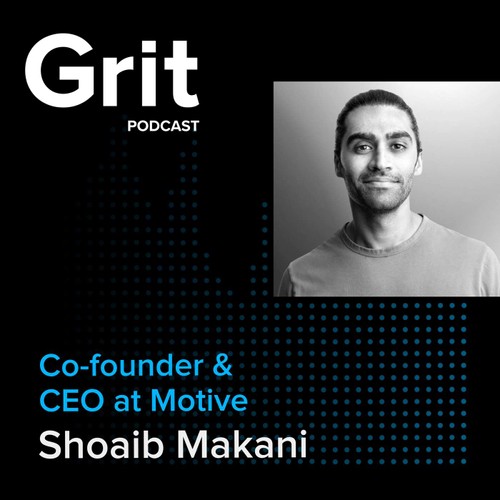
 Grit
Grit #138 CEO Motive, Shoaib Makani w/ Ilya Fushman: Powering the Physical Economy
Extra Homework
- Shoaib Makani's father made him write book reports on his homework to ensure comprehension.
- His mother, on the other hand, was his math tutor.
Venture Capital as Reinforcement Learning
- Shoaib Makani views venture capital as "reinforcement learning" for entrepreneurs.
- He cites Instacart as an example of a transformative customer experience that set a high standard.
Infectious Standards
- High standards are infectious in a company culture.
- Observing high standards makes employees more likely to replicate them.
Guest: Shoaib Makani, CEO of Motive
“When we fail,” says Shoaib Makani, “it is because we have not understood the customer problem deeply and allowed them to guide us.” This wisdom is hard-won: Motive’s first product, an app for fleet management of trucks, idled for four years before becoming a runaway success story. Emboldened by this, the CEO tried to make an orthogonal push into all kinds of freight, “guns blazing,” only to realize six months in that he had way overestimated Motive’s competitive advantage. Retreating from freight was “painful,” Shoaib recalls, but helped the company extend its existing lead in trucking — and may have saved the whole business.
In this episode — joined by special guest Ilya Fushman from Kleiner Perkins — Shoaib and Joubin discuss curiosity for the world, first impressions, reorienting yourself, electronic logging devices, directly connecting with customers, growing up as a CEO, waiting for the market, having a “low discount rate on the future,” the physical economy TAM, AI dash cams, and pricing in risk, and running out of runway.
In this episode, we cover:
- Shoaib’s Pakistani parents and doing extra homework (01:17)
- Explaining and experiencing startups (04:26)
- “High standards are infectious” (08:15)
- What Motive does (10:08)
- How Shoaib and Ilya met (10:54)
- The origins of Motive as “Keep Truckin’” (14:06)
- Working with friends (17:27)
- First-time founders (21:56)
- Deep empathy for users (24:01)
- Monetization and second-guessing (25:48)
- Sudden success and scale (29:12)
- Recruiting top talent (31:04)
- Shoaib and Ilya’s personal-professional relationship (32:07)
- “I knew the board I wanted” (34:32)
- Motive’s failed expansion into freight (36:21)
- Realizing and correcting the error (39:26)
- How to make smarter future bets (44:09)
- Second and third products (47:29)
- Back to the core mission (50:36)
- Autonomous driving vs. AI assistants (52:17)
- Thinking about competition (55:05)
- A tough conversation about runway (58:52)
- Sticking your neck out for your partner (01:04:09)
- Losing Ilya as a board member (01:06:23)
- Who Motive is hiring (01:08:32)
- What “grit” means to Shoaib (01:09:32)
Links:
- Connect with Shoaib
- Connect with Ilya
- Connect with Joubin
- Learn more about Kleiner Perkins
- This episode was edited by Eric Johnson from LightningPod.fm
